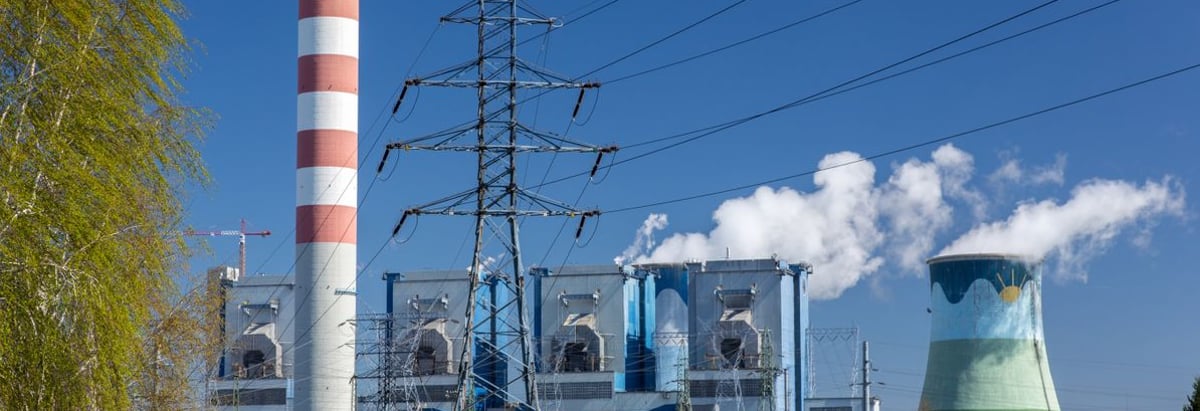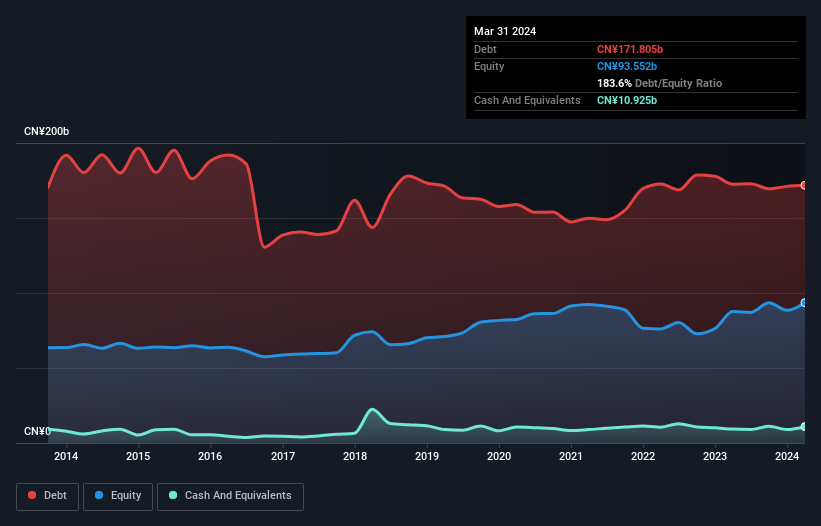- Hong Kong
- /
- Renewable Energy
- /
- SEHK:991
Is Datang International Power Generation (HKG:991) Using Too Much Debt?

David Iben put it well when he said, 'Volatility is not a risk we care about. What we care about is avoiding the permanent loss of capital.' When we think about how risky a company is, we always like to look at its use of debt, since debt overload can lead to ruin. As with many other companies Datang International Power Generation Co., Ltd. (HKG:991) makes use of debt. But should shareholders be worried about its use of debt?
Why Does Debt Bring Risk?
Debt assists a business until the business has trouble paying it off, either with new capital or with free cash flow. In the worst case scenario, a company can go bankrupt if it cannot pay its creditors. However, a more common (but still painful) scenario is that it has to raise new equity capital at a low price, thus permanently diluting shareholders. Having said that, the most common situation is where a company manages its debt reasonably well - and to its own advantage. The first thing to do when considering how much debt a business uses is to look at its cash and debt together.
Check out our latest analysis for Datang International Power Generation
What Is Datang International Power Generation's Debt?
As you can see below, Datang International Power Generation had CN¥171.8b of debt, at March 2024, which is about the same as the year before. You can click the chart for greater detail. On the flip side, it has CN¥10.9b in cash leading to net debt of about CN¥160.9b.

How Healthy Is Datang International Power Generation's Balance Sheet?
The latest balance sheet data shows that Datang International Power Generation had liabilities of CN¥88.6b due within a year, and liabilities of CN¥124.0b falling due after that. On the other hand, it had cash of CN¥10.9b and CN¥21.9b worth of receivables due within a year. So it has liabilities totalling CN¥179.9b more than its cash and near-term receivables, combined.
This deficit casts a shadow over the CN¥45.1b company, like a colossus towering over mere mortals. So we'd watch its balance sheet closely, without a doubt. At the end of the day, Datang International Power Generation would probably need a major re-capitalization if its creditors were to demand repayment.
In order to size up a company's debt relative to its earnings, we calculate its net debt divided by its earnings before interest, tax, depreciation, and amortization (EBITDA) and its earnings before interest and tax (EBIT) divided by its interest expense (its interest cover). This way, we consider both the absolute quantum of the debt, as well as the interest rates paid on it.
Datang International Power Generation has a rather high debt to EBITDA ratio of 6.4 which suggests a meaningful debt load. But the good news is that it boasts fairly comforting interest cover of 3.9 times, suggesting it can responsibly service its obligations. However, it should be some comfort for shareholders to recall that Datang International Power Generation actually grew its EBIT by a hefty 282%, over the last 12 months. If it can keep walking that path it will be in a position to shed its debt with relative ease. The balance sheet is clearly the area to focus on when you are analysing debt. But it is Datang International Power Generation's earnings that will influence how the balance sheet holds up in the future. So when considering debt, it's definitely worth looking at the earnings trend. Click here for an interactive snapshot.
Finally, while the tax-man may adore accounting profits, lenders only accept cold hard cash. So we clearly need to look at whether that EBIT is leading to corresponding free cash flow. Over the last two years, Datang International Power Generation recorded negative free cash flow, in total. Debt is usually more expensive, and almost always more risky in the hands of a company with negative free cash flow. Shareholders ought to hope for an improvement.
Our View
To be frank both Datang International Power Generation's net debt to EBITDA and its track record of staying on top of its total liabilities make us rather uncomfortable with its debt levels. But on the bright side, its EBIT growth rate is a good sign, and makes us more optimistic. Overall, it seems to us that Datang International Power Generation's balance sheet is really quite a risk to the business. So we're almost as wary of this stock as a hungry kitten is about falling into its owner's fish pond: once bitten, twice shy, as they say. When analysing debt levels, the balance sheet is the obvious place to start. However, not all investment risk resides within the balance sheet - far from it. For example, we've discovered 2 warning signs for Datang International Power Generation that you should be aware of before investing here.
If, after all that, you're more interested in a fast growing company with a rock-solid balance sheet, then check out our list of net cash growth stocks without delay.
New: Manage All Your Stock Portfolios in One Place
We've created the ultimate portfolio companion for stock investors, and it's free.
• Connect an unlimited number of Portfolios and see your total in one currency
• Be alerted to new Warning Signs or Risks via email or mobile
• Track the Fair Value of your stocks
Have feedback on this article? Concerned about the content? Get in touch with us directly. Alternatively, email editorial-team (at) simplywallst.com.
This article by Simply Wall St is general in nature. We provide commentary based on historical data and analyst forecasts only using an unbiased methodology and our articles are not intended to be financial advice. It does not constitute a recommendation to buy or sell any stock, and does not take account of your objectives, or your financial situation. We aim to bring you long-term focused analysis driven by fundamental data. Note that our analysis may not factor in the latest price-sensitive company announcements or qualitative material. Simply Wall St has no position in any stocks mentioned.
About SEHK:991
Datang International Power Generation
Engages in power generation business in the People’s Republic of China.
Solid track record and good value.
Market Insights
Community Narratives




